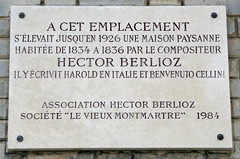Hector Berlioz
Commemorated on 4 plaques
Hector Berlioz 1803-1869 composer stayed here in 1851
58 Queen Anne Street, Westminster, W1, London, United Kingdom where they stayed
"La chambre où j'avais en 1831 écrit l'ouverture du Roi Lear était occupée par une famille anglaise. J'étais allé me nicher dans une tour appliquée contre le rocher des Ponchettes. BERLIOZ 1844
English translation: “The room where I wrote King Lear's opening in 1831 was occupied by an English family. I went to nest in a tower applied against the Ponchette rock. BERLIOZ 1844 [AWS Translate]
, Nice, France where they composed (1831)
A cet emplacement s'élevait jusqu'en 1926 une maison paysanne habitée de 1834 a 1836 par le compositeur Hector Berlioz. Il y écrivit Harold en Italie et Benvenuto Cellini.
English translation: Until 1926 there was a peasant house inhabited from 1834 to 1836 by composer Hector Berlioz. He wrote Harold there in Italy and Benvenuto Cellini. [AWS Translate]
rue Saint Vincent at rue du Mont Cenis, Paris, France where they lived (1833-1835)
Hector Berlioz (1803-1869) compositeur est né dans cette maison où il vécut les 18 premières années de sa vie.
English translation: Hector Berlioz (1803-1869) composer was born in this house where he lived the first 18 years of his life. [AWS Translate]
69 rue de la République, La Côte-Saint-André, France where they was born (1803)




